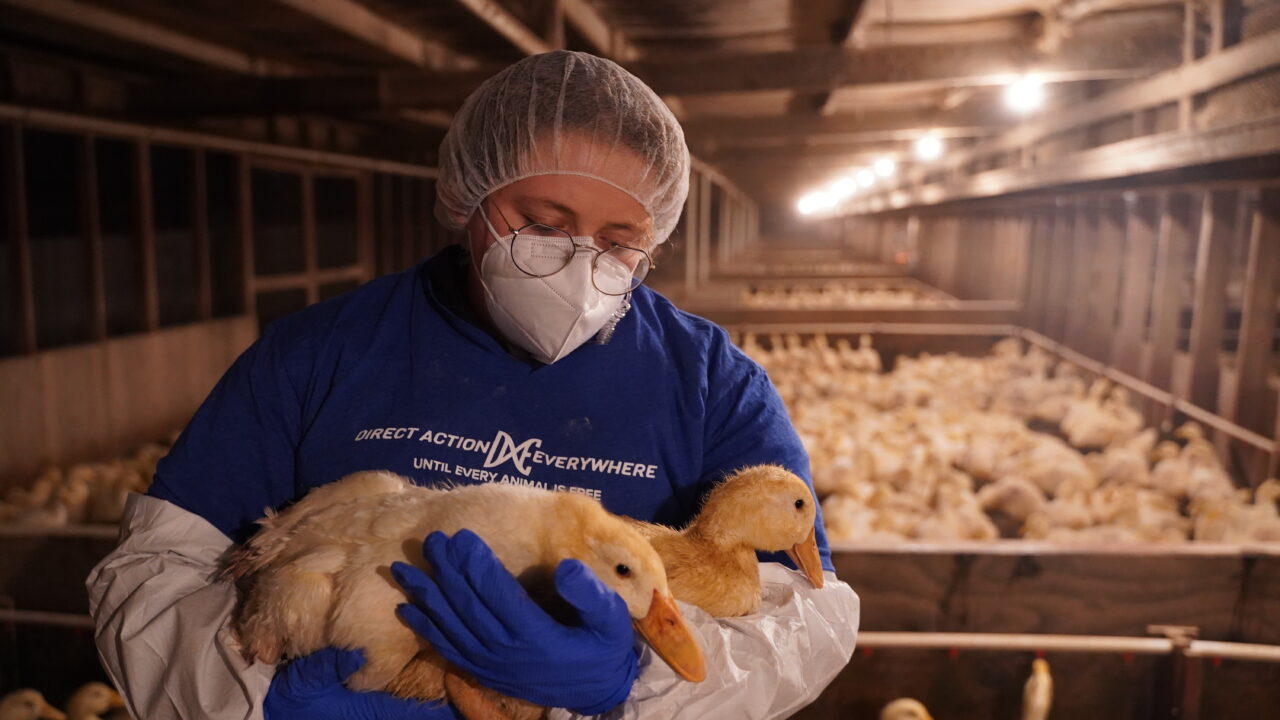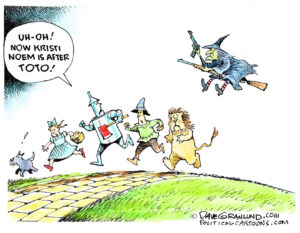I’m Facing 20 Years in Prison for Rescuing Animals
I asked my local California officials to prosecute animal cruelty. They arrested me instead. Animal rights activist Zoe Rosenberg during a rescue in Petaluma. Photo courtesy of Zoe Rosenberg
Animal rights activist Zoe Rosenberg during a rescue in Petaluma. Photo courtesy of Zoe Rosenberg
Three weeks ago, I walked up to the Sonoma County Sheriff’s Office in Santa Rosa, California carrying a folder filled with evidence of widespread crimes of animal cruelty at a nearby factory farm. An officer called out to me.
“Ms. Rosenberg!” he exclaimed.
My face lit up. It’s been a long road trying to get criminal animal cruelty taken seriously in Sonoma County, and it appeared they were finally willing to receive the evidence — so much so, they were coming to me! Just as I was about to explain my concerns, however, the officer informed me, “We have a warrant for your arrest.”
Instead of taking my report, he handcuffed me and led me to a nearby police car.
Over the past few months, I have been investigating Reichardt Duck Farm in Petaluma, the largest factory duck facility in California. The facility, which raises and slaughters more than 1 million ducks annually, has been investigated and exposed multiple times for criminal animal cruelty.
In California, the main animal cruelty law is Penal Code 597. Under PC 597, it is illegal to deprive any animal, whether they are a dog or a duck, of food and water. Many ducks at Reichardt are so sick or injured that they are unable to access necessary sustenance and slowly die of starvation and dehydration. But PC 597 also contains broader provisions that Reichardt is also violating, such as the crime of subjecting “any animal to needless suffering.” At Reichardt, the conditions systematically cause needless suffering. Ducks are crowded together on a hard, wire floor. They are denied the ability to perform natural behaviors, such as swimming and dipping their heads in water to clean their sinuses. Worst of all, diseased ducks are denied veterinary care and suffer slow, brutal deaths.
Many ducks at Reichardt are so sick or injured that they are unable to access necessary sustenance and slowly die of starvation and dehydration.
Reichardt was investigated in 2014 by Mercy For Animals, which prompted a police raid at the facility. However, law enforcement said that nothing appeared cruel or unusual and the farm was simply doing what’s done when birds are raised for slaughter, despite the fact that an independent veterinarian who accompanied the police to the facility said she witnessed “severe neglect and cruelty.”
Investigators with the animal rights group Direct Action Everywhere (DxE), including myself and others, again documented cruelty at the facility in 2019. We conducted disease testing and found deadly bacteria such as Riemerella anatipestifer. We also found dozens of animals who were so sick and neglected that some were starving and others were dying of dehydration. Law enforcement, once again, took no action.
Instead, they arrested Wayne Hsiung, the lead organizer of DxE at the time, for simply pleading with law enforcement to help the ducks during a street demonstration in front of the Reichardt site. Hsiung was convicted of trespass for his role in this demonstration and is currently in jail. The jury was unable to reach a verdict on a related conspiracy charge.
Over the past few months, while Hsiung was on trial, I went back to Reichardt to see if the criminal abuse had ceased. Nothing in the company’s practices or the animals’ condition had changed. This time, our disease testing found even more toxic bacteria, including several that are zoonotic and pose a major risk to public health, such as Staphylococcus and E. coli. This is especially worrisome given Reichardt’s poor biosecurity practices. The company crowds sick birds together, allowing disease to spread with abandon. Their barns have mesh walls and many are severely dilapidated, making it easy for wild birds and other animals to come into contact with diseased ducks.
During my investigation, I rescued two ducks, River and Oakley, who were so sick they had to be hospitalized for five days and are still on antibiotics and pain medication, more than 60 days after rescue. The first veterinarian to examine River, whose back was covered in bloody wounds, said to me, “I can’t even imagine the conditions where this could have happened.”
On Nov. 2, I attempted to report my findings to the Sonoma County District Attorney’s office. They shut the door in my face and I was forced to slide the letter under the door. Next, I hand-delivered my report to the Sonoma County Sheriff’s office, where I was told it would be forwarded to the Agriculture Crimes Unit.
I followed up via phone and email seven times and received no word that action has been taken — or would ever be taken. I also contacted the Sonoma County Animal Services Department, the California Department of Agriculture and the United States Department of Agriculture. Similarly, I received no substantive responses from any of these agencies.
The prosecution of animal rescuers is also a national problem.
The blatant disregard for animals by law enforcement isn’t just happening in Sonoma County. In 2021, the USDA was accused of ignoring animal abuse at the Monterey Zoo, despite two of their inspectors having documented violations of the Animal Welfare Act, including monkeys housed with chains around their waists. Former senior staff members at the USDA have accused the agency of prioritizing business interests over the well-being of animals. This is reflected in its lax vigilance of licensed animal facilities, which are commercial facilities, such laboratories, breeders and zoos, that are subject to inspection under the Animal Welfare Act. According to a report by PETA, U.S. enforcement actions against those facilities plummeted by 90% between 2015 and 2020.
The prosecution of animal rescuers is also a national problem. In October of 2022, Hsiung and fellow DxE member Paul Darwin Picklesimer went to trial in rural Utah on theft charges for rescuing two sick, injured piglets from a Smithfield Foods factory farm in Beaver County. Facing almost 10 years in state prison, they went before a jury and admitted that they removed two piglets, whom they named Lily and Lizzie. However, the jury determined that rescuing Lily and Lizzie was not a crime, but an act of compassion, and acquitted Hsiung and Picklesimer on all charges.
Earlier this year, my friends Alicia Santurio and Alexandra Paul went to trial in Merced County, California, facing theft charges for the rescue of two roosters, Ethan and Jax, from a transport truck outside the Foster Farms slaughterhouse. They, too, told the jury exactly what they did. Again, the jury found that rescuing animals was not a crime.
I’ve been an animal rescuer since I was 11 years old, when I founded a nonprofit organization, Happy Hen Animal Sanctuary, in San Luis Obispo, California, a decade ago. I’ve since rescued abandoned dogs from busy streets and roosters from illegal cockfighting rings. None of my prior rescues have led to me being prosecuted. For the 1,000-plus lives I’ve saved, I’ve mostly received praise from the general public and from public officials. As a result of my rescue work, I was invited to deliver a TED talk when I was 15. But in Sonoma County, I’m being called a terrorist for saving criminally abused chickens and ducks from suffering and painful death. What are we supposed to do, as concerned members of the public, when law enforcement fails to help animals in need of aid?
Following my arrest, I am now facing seven felonies and six misdemeanors that carry the possibility of more than 20 years in prison. The charges stem from my rescue of the two ducks from Reichardt, along with my rescue of sick, abused animals from Perdue’s Petaluma Poultry slaughterhouse this past June.
I was part of a company-wide investigation of Perdue in the months leading up to this rescue, which included an investigation of a factory farm in Santa Rosa, California. The facility I visited is certified organic and supplies one of Perdue’s subsidiaries, Petaluma Poultry. In the barn I investigated, mortality rates were more than double the industry standard. After just five weeks of life, over 10% of the birds had died.
Of the chickens I found who were severely debilitated and without veterinary care, I saved two of them, Petunia and Vincent. They were in critical condition, feverish and unable to stand. We rushed them to a veterinary hospital where they were seen by three veterinarians and hospitalized for five nights. Vincent and Petunia both had Coccidia parasites. Petunia also had infectious bursal disease, and Vincent suffered heart disease, infectious bronchitis virus and septicemia from a multidrug resistant strain of zoonotic Enterococcus bacteria.
Purdue’s neglect of animals is not only heinously cruel, it jeopardizes public health.
Petaluma Poultry’s slaughterhouse has also faced criticism for high rates of salmonella and campylobacter, two other toxic zoonotic bacteria. Our investigation of their slaughterhouse found that on a single day in April, more than 1,000 birds were condemned post-slaughter due either to septicemia or toxemia.
Purdue’s neglect of animals is not only heinously cruel, it jeopardizes public health. Beyond causing foodborne illness for those who consume contaminated products, this rampant spread of pathogens creates perfect breeding grounds for the next pandemic.
I reported my findings to law enforcement, but as with the Reichardt case, they failed to act. All I received was a dismissive email from the Sonoma County District Attorney’s office. So I took action myself. In the early hours on June 13, I entered the Petaluma Poultry slaughterhouse with a team of rescuers and removed four sick chickens awaiting slaughter. One of those birds was Poppy, a baby chicken who had an infected toe and a body covered in scratches. Today she is safe and free. For freeing her, I may be locked up.
I am 21 years old, a student of social change at UC Berkeley. My entire future hangs in the balance, but I am not afraid because when I look into the eyes of River, Oakley, Vincent, Petunia, Poppy and the many other animals we have rescued from Reichardt Duck Farm and Petaluma Poultry, I know it was worth it. I know that if I could go back in time, knowing what I know now, I would do it all over again.
Sonoma County may be determined to silence whistleblowers, ignore animal welfare violations and stop the liberation of animals from their torturous conditions, but we are even more determined, because we are motivated by compassion and justice, not corruption and greed. We won’t be scared into silence. As long as animals are dying without veterinary care, alone and afraid, I will raise my voice and do everything I can to help them.
Your support is crucial...As we navigate an uncertain 2025, with a new administration questioning press freedoms, the risks are clear: our ability to report freely is under threat.
Your tax-deductible donation enables us to dig deeper, delivering fearless investigative reporting and analysis that exposes the reality beneath the headlines — without compromise.
Now is the time to take action. Stand with our courageous journalists. Donate today to protect a free press, uphold democracy and uncover the stories that need to be told.




You need to be a supporter to comment.
There are currently no responses to this article.
Be the first to respond.